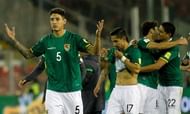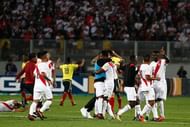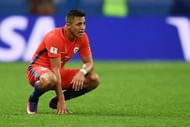
It's all over. The final matchday of the South American FIFA World Cup qualifiers (CONMEBOL) was edge-of-the-seat stuff as all five matches kicked off at the same time. They always do to avoid two teams colluding to get a desired result and, in this case, there was quite a lot at stake.
Brazil were the only team that had secured qualification prior to the final round of fixtures. Uruguay, Chile, Colombia, Peru and Argentina were to battle it out for the other four spots. The top four would qualify directly for the group stages while the fifth-placed team would play an inter-confederation play-off with New Zealand (from OFC).
By the time the final whistle blew across five stadiums in South America, it was Chile's players who sank to their knees after falling to overcome Brazil in the final round as Neymar and Gabriel Jesus ran riot in Sao Paulo.

Argentina had left it to the final game and Lionel Messi's hat-trick was enough for La Albiceleste to book their tickets to Russia. Colombia's draw with Peru also saw them qualify directly while Peru will now play New Zealand in the play-off.
The 3-0 'win' that doomed Chile
How did it come to this for Chile? They were the South American champions two years in a row, winning both the editions of Copa America in 2015 and 2016. More on that later, but it was one particular result that eventually saw them fail to qualify.
In September 2016, Matchday 6 saw Chile play Bolivia at home in Santiago and the match did not go according to plan for La Roja as the game ended in a 0-0 draw.
However, there was to be a twist in the tale. Bolivia had actually fielded an ineligible player in their squad - Nelson Cabrera - who is actually a Paraguayan-born defender who holds Bolivian citizenship.

Technically, he is a Bolivian citizen, having lived in the country for the requisite three years to gain citizenship. Unfortunately, FIFA rules state that a player needs to have lived in the country for at least five years if they are to represent the country in international competitions.
Cabrera had played for Paraguay in a friendly match in 2007 before switching loyalties. But FIFA found Bolivia guilty of fielding the ineligible player and Bolivia were forced to forfeit matches in which he played a part.
Bolivia had appealed to the Court of Arbitration for Sport (CAS) but the CAS upheld FIFA's ruling. And the Bolivian football federation did not argue that the defender had failed to meet the eligibility rules set forth by FIFA.
"The [CAS] panel dismissed such arguments, finding that FIFA had the right to initiate disciplinary proceedings against Bolivia under the FIFA Disciplinary Code within a time limit of two years.''
When Bolivia played Chile, Cabrera had come on as a 76th-minute substitute. Though the match ended 0-0, Chile were awarded a 3-0 win as Bolivia had no choice but to forfeit the game (in accordance with FIFA's rules on forf).

This 'result' helped Chile climb the standings and it understandably upset other mid-table teams, such as Argentina, who were struggling at the time.
"This is something that we knew was out of our control. We are aware of the reality and we know that we need to face it in the best possible way and change it." - Argentina coach Jorge Sampaoli
However, the ruling also saw Peru profit from Bolivia's ineptitude. The previous round of fixtures had seen Bolivia beat Peru 2-0 with goals from Pablo Escobar and Ronald Raldes. But Cabrera had come on as a substitute in this game too when he replaced Juan Carlos Arce in the 79th minute.

The result? Bolivia had to forfeit this game as well and Peru were handed a 3-0 win.
Therefore, had Chile not made the complaint, Peru would have finished with 23 points while Chile would have finished the campaign with 24 points - enough to finish fifth and go into the play-off with New Zealand.
Instead, both teams finished on 26 points and Peru finished higher thanks to their superior Goal Difference!
Chile bit off more than they could chew
The defending Copa America champions cannot point at that one result for their failure to qualify for the World Cup, though. In truth, Chile had brought about their own downfall.
South American teams have not had a summer to unwind in a long time. A World Cup and two consecutive years of Copa America tournaments had seen fatigue set in. 2017 was their first real summer break for teams from the continent.
All except for Chile who were required to play in the 2017 Confederations Cup in Russia - the precursor to the main event in 2018.

Head coach Juan Antonio Pizzi made the mistake of fielding the strongest possible team to compete in Russia and they paid the price in their quest for another international trophy. La Roja beat Portugal in the semi-finals in a game which went to extra-time before losing 1-0 to a second-string Germany in the final.
That tournament had effectively taken the wind out of their sails and by the time the World Cup qualifiers were upon them, the squad was exhausted. It became apparent when they lost consecutive matches to Paraguay and Bolivia without scoring a goal.
Those two results put their World Cup qualification in serious jeopardy. A late winner from Alexis Sanchez had seen Chile beat Ecuador in the penultimate game and it gave them some breathing room as they rose to third.
However, the final fixture against Brazil was always going to be tough and, sensing a shock upset (i.e. Chile missing out on the quadrennial tournament), the Selecao fileded a strong lineup even though they had already qualified back in March.
Chile's shocking failure to qualify saw Pizzi step down, accepting responsibility for the sixth-placed finish.

"It seems to me, although it is the responsibility and decision of the directors, we must speak and evaluate what they want for the team, try to choose the best option," Pizzi said.
"Of these options, I rule myself out. I am the one who has chosen the players, the systems and for all that, I reiterate that I assume responsibility."
For the first time in five years, Chile will now have a summer free of football; with ample time to reflect on how they failed to qualify for the biggest tournament on the planet.
